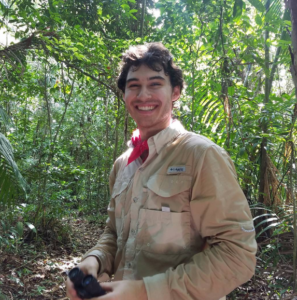My name is Steven Medina and I will be spending the summer in and around Gamboa, Panama as an REU for Professor Sunshine Van Bael. I just wanted to use this blog as an opportunity to introduce myself and some of the cool things I’ll get to do this summer as a research assistant affiliated with the Smithsonian Tropical Research Institute. As you will see there are certain defining goals that will be shaping my experience here in Panama.

I will need to get a lay of the land all the while helping my supervisor, Liz, keep her project afloat. She is investigating how leaf traits, like a leaf’s thickness or nutrient contents, influences the composition of the endophyte community living inside these leaves. Key word there is endophyte – you’re going to be hearing it a lot this summer. You know how you and I have our own, unique microbiome? How it helps us do anything and everything from digest food to regulate our moods? Well, endophyte communities are like the plant version of that. They’re microfungi that live commensally in almost all known plant species. They have all sorts of roles, and one of the major goals in Professor Van Bael’s lab is to identify them and quantify them. Liz is already finding that they may play a role is helping plants resist flooding and influxes of salt levels (i.e. sea level rise), while another Ph.D. student in our lab, Steve Formel, is finding that endophytes may play a role in breaking down oil. Long story short, in order to learn about the important roles endophytes, have in shaping the ecosystem around them, we need host plants to experiment on. Therefore my first weeks here will be spent collecting seeds and growing healthy seedlings that we can run experiments on.
After a few weeks, I’ll be able to start working on the REU portion of this project. I will be inoculating some of the seedlings that I am growing with pathogens that were found to be naturally occurring in these plant species, and I’ll quantify the damage. After the pathogen runs its course, lesions of disease will be extracted and cultured to fulfill Koch’s postulates. Until this point, we have observed specific organisms causing disease. We have removed them from the lesions of disease and cultured them in New Orleans. The results garnered by inoculating the host species with the organism found in the lesions of disease allows us to say whether or not the organism in question is truly causing the disease.
Stay tuned for next week! I will be showing you what science looks like in the field at the beautiful, famous Barro Colorado Island, as well as one of the most remote jungles in the world!